Rejuvenate Your Car: Toyota Tazz Engine for Sale Now Offered
Rejuvenate Your Car: Toyota Tazz Engine for Sale Now Offered
Blog Article
Engine Purchasing Professional Tips on Picking the Right Engine for Your Specific Needs
Picking the best engine for your details demands includes a complex interaction of aspects that go beyond mere horse power figures. By diving right into the complexities of power versus efficiency, reviewing fuel rankings, and budgeting for long-lasting costs, one can absolutely enhance their engine selection.
Power Vs. Performance: Discovering the Balance

When picking an engine, it is critical to strike a balance between power and performance to meet your particular requirements properly. Power refers to the engine's capability to generate power for propulsion, figuring out aspects like acceleration, pulling capability, and overall efficiency (Toyota Tazz Engine For Sale). On the other hand, effectiveness associates with exactly how well the engine makes use of fuel to produce power, impacting variables such as gas economic situation and environmental friendliness
Attaining the best balance in between power and efficiency is necessary since an engine that is too effective may take in excessive gas, bring about greater operating costs and unneeded strain on the setting. Conversely, an engine that focuses on effectiveness over power might cause slow efficiency, particularly popular circumstances like towing heavy lots or driving uphill.
To make a notified choice, think about factors such as your regular driving conditions, the designated usage of the car, and your individual choices. By reviewing your needs and priorities, you can choose an engine that strikes the perfect equilibrium between power and efficiency, making certain optimal efficiency while reducing environmental effect and operating expense.
Recognizing Engine Dimension and Type

Usual engine types consist of inline engines, V engines, and rotary engines, each with its one-of-a-kind advantages and drawbacks. Understanding the interplay between engine dimension and kind is essential in selecting an engine that lines up with your certain requirements and priorities, whether it be power, performance, or a balance of both.
Consider Your Lorry's Needs
Considering your car's requirements is a basic action in the engine selection procedure to guarantee optimal efficiency and performance. It is necessary to review elements such as the meant use the car, its weight, pulling capacity, and fuel efficiency needs. For instance, if you are looking for an engine for a sturdy vehicle that will be made use of for towing, you will certainly require an effective engine with high torque abilities. On the various other hand, if you are choosing an engine for a small cars and truck primarily made use of for city travelling, fuel performance may be a more essential variable to consider.

Evaluating Fuel Effectiveness Rankings
Examining gas effectiveness scores is an important facet of choosing the appropriate engine for your automobile, making sure cost financial savings and ecological sustainability. Fuel efficiency rankings, normally determined in miles per gallon (MPG) for gasoline engines or kilowatt-hours per 100 miles (kWh/100 miles) for official statement electrical engines, indicate how much a car can travel on a particular amount of gas or power. Greater MPG or reduced kWh/100 miles values indicate extra efficient engines, converting to reduced fuel expenses and lower carbon emissions.
When reviewing fuel effectiveness rankings, consider your driving practices and needs. A highly fuel-efficient engine can result in significant cost savings over time if you commute long ranges daily. Additionally, compare different engine alternatives within the same vehicle class to recognize the most affordable option. Elements such as engine size, weight, the rules of aerodynamics, and hybrid or electrical abilities can all affect gas performance.
Budgeting for Long-Term Expenses
Purposefully preparing for long-lasting additional info expenses is essential when picking an engine, guaranteeing financial sustainability over the lorry's life-span. While the first acquisition cost of an engine is a substantial element, it is critical to take into consideration the long-term costs associated with upkeep, repair work, and fuel consumption.
Moreover, investigating the schedule and cost of substitute components for the chosen engine is essential in budget plan preparation. By thoroughly budgeting for these lasting costs and factoring them right into the decision-making process, people can select an engine that not just meets their instant demands but likewise continues to be affordable throughout its life-span.
Conclusion
To conclude, selecting the ideal engine for your details needs needs stabilizing power and efficiency, recognizing engine size and kind, considering your vehicle's demands, evaluating fuel effectiveness rankings, and budgeting for long-lasting prices. By carefully thinking about these aspects, you can make certain that you choose an engine that meets your requirements and supplies optimum efficiency for your vehicle.
To even more fine-tune the choice procedure of an engine that strikes the optimum balance between power and effectiveness, it is crucial to delve into the intricacies of understanding engine size and type. Engine dimension refers to the complete quantity of air and gas that can be pressed via the engine cyndrical tubes. Usual engine kinds consist of inline engines, V engines, and next rotating engines, each with its one-of-a-kind benefits and downsides. Recognizing the interaction in between engine dimension and type is crucial in choosing an engine that lines up with your particular requirements and concerns, whether it be power, efficiency, or a balance of both.
Fuel efficiency ratings, generally measured in miles per gallon (MPG) for gasoline engines or kilowatt-hours per 100 miles (kWh/100 miles) for electrical engines, show exactly how far a car can travel on a specific quantity of gas or electricity.
Report this page